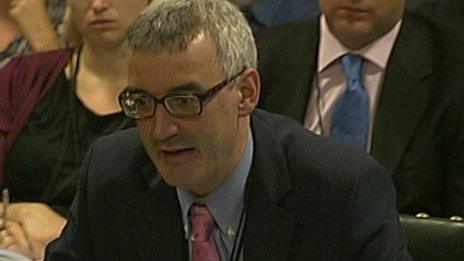Scottish independence: Swinney steps up Treasury criticism over pound
- Published
Finance Secretary John Swinney MSP answers your questions on the Scottish independence referendum in a BBC Scotland webcast.
Scottish Finance Secretary John Swinney has stepped up his criticism of the UK Treasury's top civil servant for entering the debate over independence.
Sir Nicholas MacPherson said a currency union with an independent Scotland would be "fraught with difficulty".
In a BBC webcast, Mr Swinney said Sir Nicholas's comments on currency had "crossed the line" of civil service neutrality.
The Treasury said Sir Nicholas's advice was "completely impartial".
His recommendations to the chancellor were published as the three main Westminster parties ruled out a formal pound-sharing agreement with an independent Scotland.
They said the decision was based on advice from Sir Nicholas.
The Treasury's permanent secretary, who is also the civil servant in charge of co-ordinating the UK government's effort to persuade Scots not to vote for independence, questioned the Scottish government's commitment to financial discipline.
Mr Swinney described this as an "extraordinary attack".
Speaking about Sir Nicholas's intervention, Scotland's finance secretary said: "I thought it crossed the line.
"It's perfectly permissible for civil servants to provide advice to ministers on all sorts of questions. To enter the debate in the fashion that Sir Nicholas entered the debate, which was a partial entrance, I thought was entirely over the line."

Sir Nicholas MacPherson is the permanent secretary to the UK Treasury
But a Treasury spokesman said: "The advice given was completely impartial. It is time that the Scottish government set out alternative currency plans and engage in the substance of the debate."
Both the UK and Scottish governments have issued guidance to civil servants on how they should deal with issues around the Scottish referendum on independence, which takes place on 18 September.
The UK government advice states, external: "The UK Government's policy is to maintain the United Kingdom. It is therefore both legitimate and necessary for civil servants to support ministers as fully as possible in pursuit of those objectives".
The Scottish government's advice to civil servants states, external: "In the run-up to the independence referendum, civil servants may support Scottish ministers in developing and presenting the case for independence and encouraging the wider debate on Scotland's constitutional future."
The day after Sir Nicholas's letter to the chancellor was published, Peter Riddell of the Institute for Government, external think tank said it was "highly unusual".
He said: "The concern is that this was a hasty decision that will have unintended consequences for advice given to ministers on future major issues - including referendums."
The issue of civil service impartiality has previously been raised in the Scottish Parliament when Labour, the Conservatives and the Liberal Democrats complained to the head of the UK civil service about Sir Peter Housden, the permanent secretary to the Scottish government in 2011,
Sir Peter was accused by the former Liberal Democrat leader, Tavish Scott, of "rapidly becoming the chief cheerleader" for independence.
The then head of the UK Civil Service, Sir Gus O'Donnell, said it was "right and proper" that civil servants should act to support their elected ministers, in this case the devolved Scottish government.